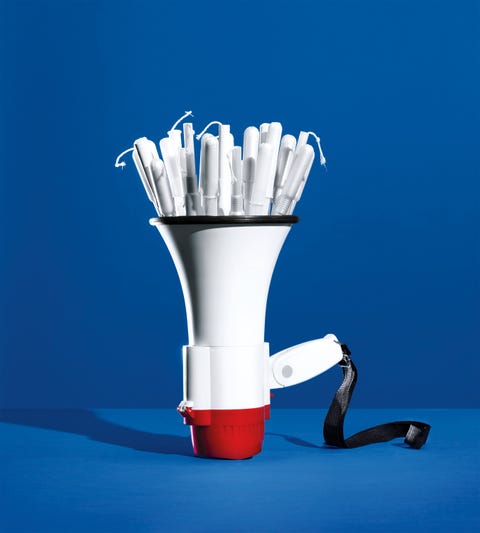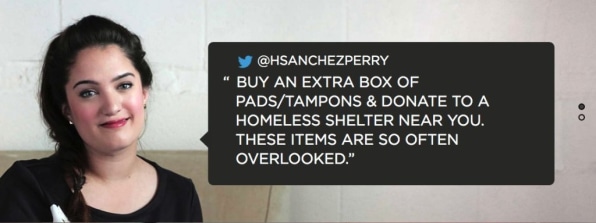
Photo: Cosmopolitan.com
What makes it justifiable for a person to have to weigh if
their physical ---bleeding--- first aid emergency is a priority?
Ana is one of many women who shared their stories about lack
of accessibility to feminine hygiene products with FreeTheTampons.org, an organization
dedicated to making menstrual supplies readily accessible everywhere. Women all
over the country must endure embarrassment, humiliation, and emotional ordeals
to access a basic first aid need. Women who had to walk around with another
shirt or jacket to cover their waist as they bled through looking for aid.
Women on airplanes. Women at work. Women who have to ask male coworkers for
quarters.
See, if someone gets a cut, we have band aids. If someone
sprained their ankle, we have wraps. If someone hits their head, we have a cold
pack.
But, when a woman is bleeding from within her, we need to
find quarters to get tampons?

Acute Pelvic Inflammatory Disease (Source)
WHAT CAN HAPPEN?
Why are period products a big deal? According to the US National Library of Medicine National
Institutes of Health, menstrual hygiene management vary and depend on multiple
factors such as socioeconomic status and resources. In their research, they
found that lack of hygiene during this period causes:
1.
Adverse pregnancies
2.
Pelvic inflammatory disease
3.
Urogenital diseases that affect the urinary
tract including kidneys, ureters, bladder and reproductive organs
Many of us may not think about the importance of menstruation hygiene since the source of the matter is mainly concealed, unlike an open wound. We need to remember that the underlying health issues are much more profound.WE NEED TO TALK ABOUT IT
In August 2015, now President Donald Trump was infamously
quoted for his comment that Fox News host Megyn Kelly had “blood coming out of
her wherever” to underrate her during the Republican debate. Already well-known for blunt comments towards women, Trump caused an uproar especially in
social media. This event birthed the #PeriodIsNotAnInsult hashtag which signified a level of ignorance to address in regards to female menstruation and the health issues
women must endure during this period.
So, let’s aim to educate.
Cosmopolitan UK had compiled some answers that guys wanted to know about periods:
Cosmopolitan UK had compiled some answers that guys wanted to know about periods:
1. Women’s bodies don’t run on exact schedule: the period can turn up days earlier or later than expected
2.
Women bleed 30-80ml of blood during this period
3.
It can last 5-7 days
4.
Cramps are usually the worst on the first day
5.
The pain can induce head and back aches, nausea,
bloating, soreness and mood swings
6. Tampons doesn’t bother women unless it’s inserted incorrectly
7.
A woman may spend around $10-30 in
feminine products a month --- this is a huge expense for families living on a tight
budget (based on dollars instead of euros in the article)
8.
You can help by first understanding the
physical---then mental---struggle which then causes irritability. Offer a
painkiller or heat pad and provide support and patience.
MORE WOMEN NEEDS IT THAN EVER
In 2011, Holly Sanchez was 19 when she took a job organizing
donations for transitioning homeless women and children, many escaping abusive relationship.
She was going through the donation closet when she found only two boxes of
tampons and realized, “when we think of people experiencing homelessness, we
think of things like food or clothing… periods don’t go away because someone
doesn’t have a home.”
Holly met homeless women who used rags, who reused these rags without
being able to sanitize, and who would steal toilet paper from public restrooms.
She also learned that some had to
choose to spend what little money they had between feminine products or food. To her, “the
options are inhumane.”
After joining efforts with DoSomething.org and U by Kotex, Holly
has been able to help collect 585,965 period products in 50,257 drives that are
distributed to shelters all over the country.
In another arena, women from Riker’s Island correctional
facility described experiences from the same problem. 24-year-old Tara was on
her cycle when she was arrested. When she asked for a sanitary pad, she was
provide a sterile gauze pad, the kind that go on a scrape on your arm, which arrived more than
an hour later.
Another woman recalled how an officer threw a bunch of
tampons at a crowd of female inmates and everyone dove in because they don’t know when they would get one next.
Another woman expressed an extreme drop in self-esteem as she had to sit upon terrible menstrual hygiene due to the scarcity of feminine products distributed. Women had to live horrific and degrading experiences simply because there was a lack of a basic supply.
The good news is in June 2016, with a unanimous vote of 46-0,
New York City “passed a law to provide tampons for all girls and women in public
schools, correctional facilities and shelters across the state.”
This is one step in a great conversation.
Photo: Cosmopolitan.com
FIRST AID, PERIOD.
In sheer determination, Ana stuffed toilet paper in her underwear that shifted in every move in order to leave the bathroom so that she can reach her
professor and declare a menstrual emergency. With permission, she then headed
to the campus store to purchase supplies while missing her own opportunity for
her education.
In alternate scenario, if her classrooms held period supplies for emergency purposes, Ana did not need to miss out on her favorite class, let alone feel the need to explain her situation.
In alternate scenario, if her classrooms held period supplies for emergency purposes, Ana did not need to miss out on her favorite class, let alone feel the need to explain her situation.
We also need to remember about the young girls who will start their period for the first time. Young girls who would have to go to whoever is available and getting them what they need immediately should be as easy as getting a band-aid.
Having the menstrual cycle, and being a woman at that, isn’t something to be embarrassed about and isn’t something to lose dignity for.
Feminine hygiene products need to be available in schools, facilities, buses, airplanes and all other public places that are just as much required to have first aid kits.





Comments
Post a Comment